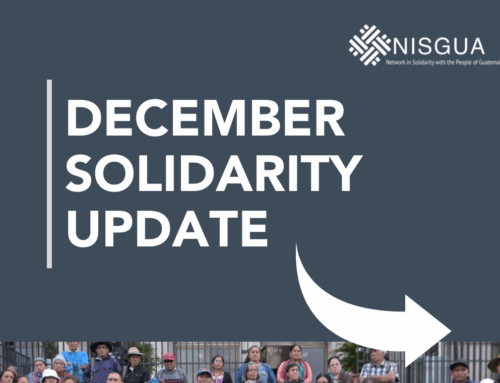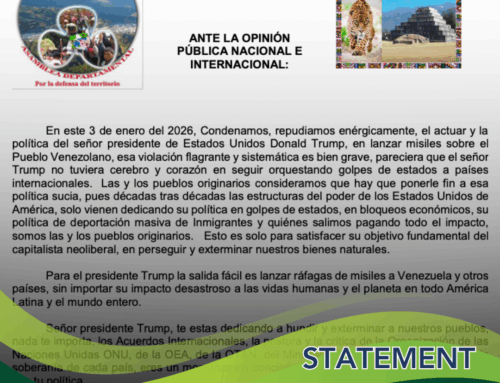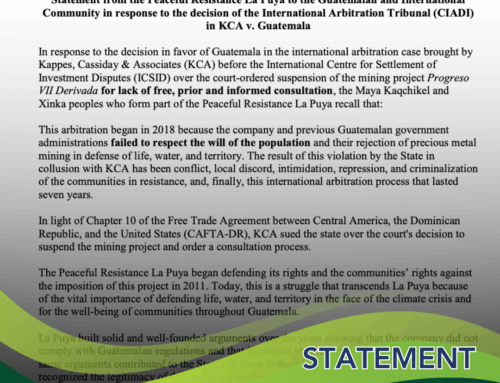|
Solidarity Update: May 27, 2016
|
|
Justice & Accountability
- Final arguments heard to determine whether CREOMPAZ case will be sent to trial
Defense of Life & Territory
- More than 99% of participants vote ‘NO’ to resource extraction in Quesada municipal consultation
- Guatemala’s highest court upholds suspension order for El Tambor Mine
- Communities neighboring Tahoe Resources’ Escobal mine are impacted by structural damage to homes
News from the Grassroots
- Announcing our 2016 Fall tour: “Guatemalan Women Healing Toward Justice”
- Solidarity house party season kicks off in Seattle
- Double the impact of your gifts this June!
|
|
Women listen to the arguments made by defense lawyers in the CREOMPAZ case, trying former military officers for crimes against humanity.
Photo: Nelton Rivera,
Prensa Comunitaria
|
|
|
Final arguments heard to determine whether CREOMPAZ case will be sent to trial
During the month of May, the public prosecutor’s office, co-plaintiffs, and defense lawyers presented preliminary evidence in the CREOMPAZ case. With defense arguments wrapping up yesterday, Judge Claudette Domínguez of Guatemala’s High-Risk Crimes Court “A” has given a two-week timeline for delivering her decision on whether former military officers will stand trial for crimes against humanity.
Ten people were indicted on charges related to forced disappearances committed during the 1980s based on evidence uncovered in the former “Military Zone 21,” now known as the CREOMPAZ peacekeeping base in Cobán, Alta Verapaz. A three-year investigation and several exhumations uncovered the remains of 558 people who were disappeared when several of those indicted held chain of command positions within the military. Read more about the CREOMPAZ case here.
The prosecution’s case is built on more than 350 witness testimonies and 20,000 pieces of documentary evidence. Given its enormity, the trial – if it goes forward - is expected to take several months. Follow @NISGUA_Guate on Twitter for continuing coverage.
|
|
|
Jaime Guadalupe López Hernández, a local observer, presides over the municipal consultation held in Quesada, Jutiapa on May 8. Voters were deciding whether or not they were in favor of resource extraction activities taking place on their lands. Photo: NISGUA
|
|
|
DEFENSE OF LIFE & TERRITORY
|
|
More than 99% of participants vote ‘NO’ to resource extraction in Quesada municipal consultation
On May 8, more than 8,000 people participated in a community consultation in Quesada, Jutiapa, with 99% of voters expressing firm opposition to resource extraction on their lands. Primarily Xinca territory, Quesada is the first municipality in Jutiapa to carry out a consultation on issues of resource extraction.
This consultation is among dozens that have taken place throughout the country since 2005. Communities have used it as one strategy to peacefully defend their lands from the imposition of mining and hydroelectric companies who have been granted licenses without their consent. In recent years, more than 50,000 people have voted in municipal consultations around Tahoe Resources’ Escobal mine, in an attempt to halt production and prevent the company’s expansion.
Jaime Guadalupe López Hernández, a volunteer organizer and a member of the Quesada Civil Society Organization in Defense of Nature, expressed the importance of protecting land for future generations. “As Xinca organizations, our ancestors bestowed upon us both the rights and the obligation to protect Mother Earth. We want to give this same land to future generations so that they can enjoy what we’ve inherited.”
|
|
Guatemala’s highest court upholds suspension order for El Tambor Mine
Despite orders by the Constitutional Court, the Supreme Court, and the Ministry of Energy and Mines to suspend operations, communities have reported that Kappes, Cassiday and Associates (KCA) continue to operate the El Tambor mine, located on the outskirts of Guatemala City.
In an appeal hearing on February 22, 2016, the Guatemalan Supreme Court ruled in favor of the peaceful communities in resistance “La Puya,” and ordered the Ministry of Energy and Mines (MEM) to suspend KCA's exploitation license, in part due to lack of prior community consultation. Under pressure by communities camping outside of MEM’s office, the Ministry finally issued a ruling suspending mining activities on March 10, 2016. These decisions were upheld in Guatemala’s Constitutional Court, when a provisional court injunction was granted that suspends the license. Nevertheless, national newspapers published photos of workers as they continued to transport silver, gold and other materials from the mine site on foot and by helicopter in the days that followed, in direct defiance of court orders.
On April 6, KCA’s president Daniel Kappes posted a paid ad in Guatemala's largest newspaper, Prensa Libre, claiming that radical terrorist and anarchist-minded NGOs have instigated local resistance to mining for their own financial gain. This deceitful, defamatory rhetoric follows a national pattern of right-wing military and business interests attempting to delegitimize movements for justice, accountability, and self-determination by criticizing international organizations that support threatened human rights defenders.
International organizations have called on KCA to comply with the court orders and immediately halt all operations. Read the full letter here.
|
|
Communities neighboring Tahoe Resources’ Escobal mine are impacted by structural damage to homes
For months, families in the community of La Cuchilla have reported the appearance of cracks in the walls and foundations of their homes. Now, after two houses have completely collapsed, the community has been deemed uninhabitable by the Office of National Coordination for Disaster Reduction (CONRED). Several families are now living in temporary shelters while they await the possible relocation of their community.
La Cuchilla is located in the municipality of San Rafael las Flores, just uphill from where Tahoe Resources operates the Escobal mine through its subsidiary, Minera San Rafael. Since commercial production began in 2014, communities have reported major tremors due to mining operations and heavy truck traffic. Although the exact location of the mine’s tunnel operations is concealed from the public, it is believed that at least one of the tunnels runs directly below La Cuchilla.
A January report published by CONRED found the community at high risk due to land instability and declared the area uninhabitable, but declined to mention Tahoe Resources or comment on the causes of instability.
La Cuchilla held a community consultation on March 23, 2013 in which over 96% voted NO to mining; less than a month later, the Escobal exploitation license was granted. Now, only three years later, the same community is being forced to evacuate their homes.
|
|
Activists in Toronto, Vancouver, and Reno post "Wanted" posters on the same day as Tahoe Resources' Annual General Meeting. For more photos from the action, click here.
Photo: MISN
|
|
|
Announcing our 2016 Fall tour: “Guatemalan Women Healing Toward Justice”
We are excited to announce our Fall 2016 speaking tour, “Guatemalan Women Healing Toward Justice: The Case of Sepur Zarco,” featuring Maudí Tzy of the Alliance to Break the Silence and End Impunity! Through her work as a psychologist and a member of the Community Studies and Psycho-social Action Team (ECAP), Maudí has played a crucial role in integrating healing practices into movements for social and environmental justice in Guatemala.
Most recently, Maudí has been working as part of a multidisciplinary team to support the women survivors of Sepur Zarco in their landmark case against former military personnel for sexual violence and slavery committed during Guatemala's internal armed conflict. In February of this year, this case made history by successfully trying sexual slavery as a crime against humanity —a first in the Americas for a case carried out in a national court. Read NISGUA's report on the Sepur Zarco case.
This October, NISGUA is honored to accompany Maudí Tzy on a tour of the Southwest and Western United States to celebrate this historic victory by building toward cross-border movements for gender justice and an end to violence against women! The tour is tentatively scheduled for October 7-21, with anticipated stops in Austin, Tuscon, Los Angeles, San Francisco, and the Pacific Northwest. Write to organizer@nisgua.org for ways to get involved! Click here for a full tour announcement.
|
|
Solidarity house party season kicks off in Seattle
Earlier this month, members of the NISGUA network hosted a house party in Seattle to celebrate the landmark victory in the case of Sepur Zarco. Participants wrote messages expressing solidarity with the women survivors whose testimony helped win the case, while raising funds to support our ongoing accompaniment and program work in support of human rights defenders.
You, too, can repeat the success of the Seattle event and join people from across the country this spring and summer in standing with the women of Sepur Zarco! We invite you to hold a house party in your city celebrating the organizing power and resilience of our communities as we come together to ensure that international attention is sustained in the wake of this precedent-setting verdict. Visit our blog for more information on hosting a house party and message ideas!
|
|
Double the impact of your gifts in June!
From June 15-30, a small group of dedicated NISGUA supporters have generously pledged to match all contributions to NISGUA dollar-for-dollar up to $10,000! We take inspiration from the commitment of these long-time donors, some of whom have worked as accompaniers or as members of sponsoring communities, and hope that you’ll join them in raising $20,000 for NISGUA in late June.
As a grassroots-funded organization, we are incredibly grateful to our base for sustaining our work alongside Guatemalan human rights defenders. During June, your generous support can have double the impact in supporting ongoing solidarity in Guatemala and the United States.
|
|
|
|











Leave A Comment